Tribeca Festival — from Lower Manhattan to Lisbon
The power of storytelling as a cultural union
The Tribeca Festival, founded 2001 in New York by Robert De Niro and Jane Rosenthal, held its first edition in Lisbon October 17-19, marking the city as a new epicenter of independant film culture. It was set in the inspiring venue of the Unicorn Factory Lisboa in the Beato Innovation District. Tribeca Festival Lisboa celebrated the art of cinema with a mix of Portuguese and U.S. independant films, and a programme of series, music, talks and podcasts — that reflected the diversity and power of audiovisual storytelling. Robert De Niro emphasised the importance of Lisbon as host, highlighting the city’s role in uniting communities and inspiring creativity.
Production, script and words Mónica Lopes
Cinematography, editing, grading graphics and photos Danilo Miranda Cares
ZOOT in collaboration with Universidade Lusófona
The festival programme included International films like the Sundance highlight “In the Summers“ as well as “Anora” by Sean Baker which won him the Palme d’Or at the 2024 Cannes Film Festival and this year´s main winner at the Tibeca Fesival “Griffin in Summer“ . The National showcase was dedicated to films Made in Portugal, including the premiere of “Os Sonhos Continuam //The Dreams Continue” by emerging Portuguese filmmaking duo Marlee and Karlee Rodrigues. Four stages divided the activities, with Tribeca talks exploring topics such as the impact of artificial intelligence on cinema and female empowerment.
Among the more than 100 guests were National and International figures, including amongst others American actor, writer and director Chazz Palminteri, Dino D’ Santiago – Portuguese musician, composer and activist of Cape Verdean descent; Mozambican writer Mia Couto; Luís Sequeira – a Canadian costume designer of Portuguese origin and Angolan writer José Eduardo Agualusa. The event was organised in partnership with Tribeca Enterprises, SIC, OPTO and Lisbon City Council, strengthening Lisbon as a hub for innovation and global cultural exchange.

The Tribeca Festival´s inaugural edition in Lisbon not only displayed a curated selection of independant films, celebrating film as an art form — it also showcased stories that emphasized the importance of storytelling as a universal cultural expression, a conduit for cross-cultural dialogue. This Lisbon edition brought together prominent figures in cinema, such as Robert De Niro, “Wonder Woman” director Patty Jenkins, actor and director Griffin Dunne, film producer, Tribeca co-founder, CEO, and executive chair of Tribeca Enterprises Jane Rosenthal, and Whoopi Goldberg . They shared their personal perspectives on how cinema and storytelling work as factors of cultural unity, showing audiences an authentic and globalised view of the world, while reinforcing the universality of human stories.

Jane Rosenthal, co-founder of Tribeca, explained that the festival was born as a response to 9/11, with the aim of uniting people through stories.
From the beginning, our goal was to create a platform where stories could find their audience.
— Jane Rosenthal
That purpose has transformed Tribeca into a global community united by its stories. For Patty Jenkins, storytelling at film festivals is essential for the authentic expression of diverse cultures. The director of films such as “Wonder Woman” emphasised:
Festivals address the stories that make us question, understand and connect with each other.
— Patty Jenkins

Jenkins told ZOOT that the experience provided by Tribeca is more than cinema, it encompasses other art forms, such as fashion, which complement and intensify this cultural experience, offering a complete and immersive experience to the audience.

Griffin Dunne shared a concrete perspective on the importance of costume and visual elements in building richer characters and narratives. To ZOOT, the actor and director recalled Robert De Niro’s experience in the Scorsese´s film classic Mean Streets, in which the actor only fully understood his character, Johnny Boy, after putting on a hat. For Dunne, this kind of visual immersion is essential: “The costume says everything about the character,” he said, stressing that cinema is an art in which these details help the audience to instinctively connect with stories and emotions.
Whoopi Goldberg added an even broader vision by addressing storytelling as a mirror of society, reflecting contemporary changes, aspirations, and challenges. For Whoopi, cinema is a powerful way of promoting empathy and understanding on a global scale.

Storytelling is a powerful tool not only for entertaining, but for creating empathy and understanding.
— Whoopi Goldberg
She sees festivals like Tribeca as an opportunity for audiences to find stories that they can identify with and that awaken a deep sense of cultural identification. The power of storytelling at the Tribeca Festival aims to boost new talent and wants to support education and training.
ZOOT was at Tribeca Festival Lisboa in partnership with Universidade Lusófona. Manuel José Damásio, director of Lusófona University’s Film and Media Department, was recently elected president of the Centre International de Liaison des Ecoles de Cinéma et de Télévision (CILECT), the International Association of Film and Television Schools, founded in Cannes in 1954. This achievement was announced during a conference at the Communication University of China, in Beijing, and highlights the role of Universidade Lusófona as a reference in cinema teaching and in this kind of cultural events.

To boot…
Tribeca Festival I @tribeca I tribecafilm.com
Universidade Lusófona I @ulusofona I ulusofona.pt





